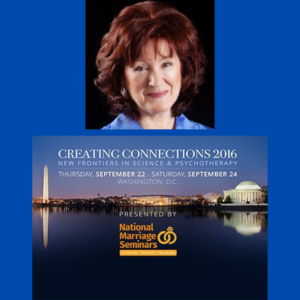Dr. Dan Wile On-Demand
Original price was: $199.00.$99.00Current price is: $99.00.
Black Friday discount already applied. Even the most experienced therapists can be challenged in their efforts to move couples beyond the patterns of intense adversarial interaction and withdrawal that frequently characterize couple conflict. Collaborative Couple Therapy, developed by Dan Wile, Ph.D., provides therapists with a unique model for moving couples beyond this spiral of alienation and into a cycle of connection.
Description
Course Overview
In Collaborative Couple Therapy, we take the problem that is occurring at the moment and, by giving voice to each partner’s experience, transform it into a moment of intimacy. If Joe says to Carol, “It’s always about you. You’re selfish. You never consider anyone else. You never think about me at all,” the therapist, doubling for Joe, says, “As you can see, I’m angry” or “I worry you’re going to leave me” or “I fear we’re drifting apart” or “I worry you don’t like me anymore” or “I miss the way we use to be” or “What happened to us?” The therapist transforms Joe’s blurted out accusation into a disarming self-disclosure by bringing out the wish or fear hidden in the complaint. Since the therapist is making a guess, she or he immediately adds, “Where am I right and where am I wrong in my guess about how you feel?” John and Julie Gottman, who use doubling in their acclaimed couple therapy approach, have granted Dan the honor of calling their use of this method, “Doing a Dan Wile.”
The ultimate goal of Collaborative Couple Therapy is to increase the couple’s ability to:
- Solve the moment—to have the conversation needed to deal with whatever comes up in the relationship and, in particular, to recover from the inevitable periods of fighting and/or withdrawing.
- Create a platform—a vantage point above the fray—from which to guide the relationship and turn problems into opportunities for intimacy.
At the completion of this training, you will be able to:
- Help each partner find her or his voice
- Serve as each partner’s spokesperson
- Recognize the wish or fear concealed in the partner’s complaint
- Catch the fight before it escalates
- Recognize the power of acknowledgments in turning fights into conversations and alienated exchanges into intimate ones
- Bring partner in on what you’re doing in a manner that deepens the therapy and increases partners’ sense of safety.
- Empathize with the less likable partner
- Uncover the conversation hidden in the fight
- 12 CEs available for $39.99
Presenters Bios

Dan Wile, the beloved husband and therapist, died on March 18th, 2020.
August 3, 1938 – March 18, 2020
Dan Wile, Ph.D., the developer of Collaborative Couple Therapy, is internationally recognized for his innovative work with couples and his expertise in transforming conflict into opportunities for intimacy. He has been described by leading marital therapy researcher, John Gottman, Ph.D., as “a genius and the greatest living marital therapist.”
Dr. Wile’s clinical expertise includes forty years as a couple’s therapist. He is was an Assistant Professor at the University of California at Berkeley, and taught at several graduate programs in the San Francisco Bay area. Renowned for his engaging personal style and unique ability to skillfully address both theory and practice.
Dr. Wile has published widely on psychotherapeutic theory and couple therapy. He is the author of Couples Therapy: A Nontraditional Approach, After the Honeymoon: How Conflict Can Improve Your Relationship and after the Fight: Using Your Disagreements to Build a Stronger Relationship.
Cancel/Refund Policy
Disclaimer, Refund, Policy Cancellation Policy Agreement*
Refund, Disclaimer & Cancellation Policy: ALL SALES ARE FINAL. In the event a seminar is canceled National Marriage Seminars, Inc. is only responsible for reimbursement of fees paid for the seminar with the exception of force majeure. All costs incurred for travel arrangements are the sole responsibility of the individual or entity that made those arrangements. National Marriage Seminars, Inc. reserves the right to move venue location and assigned presenters originally advertised for an event with a 30-day notice to attendees. In the event a venue or presenter is changed, no reimbursements will be given. Venue changes are not to exceed 50 miles or 1 hour drive time from the original venue advertised. The individual or entity that made the arrangements to attend a National Marriage Seminars, Inc. event agrees to hold harmless National Marriage Seminars, Inc., its directors, and employees from any and all liability associated with those travel arrangements. By registering for any National Marriage Seminars, Inc. sponsored or hosted event the individual or entity agrees to these terms. National Marriage Seminars has the right to move this training to an on-demand format based on COVID-19 recommendations with city and CDC guidelines during a pandemic or natural disaster.
CE’s: CE’s are NOT included in the price of these workshops, however, they will be available for purchase at the event.
Grievance Policy: It is the mission of National Marriage Seminars of America to find presenters who serve as a gateway to enhance clinical skills and to produce and distribute their work with integrity. We also believe in creating a learning environment that respects the diversity our attendees bring to these events. If you are dissatisfied with your experience, please email us at admin@nationalmarriageseminars.com or contact us via phone at 813-960-0001 to further discuss your concerns.
Event Details
12 CE Hours (available for $39.99 through National Marriage Seminars of America)
12 Hours of video lecture and handouts
Day 1: Once this item is purchased, you will receive an email within 24-hours with information to access the on-demand training.
Start time:
00:00 a.m. EST
End time:
00:00 p.m. EST
Venue: On-Demand
Phone: 813-960-0001
Email: lori@nationalmarriageseminars.com








